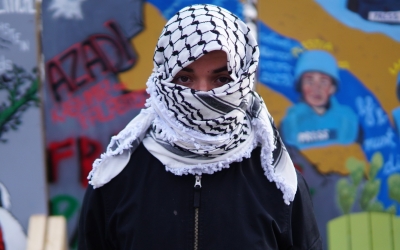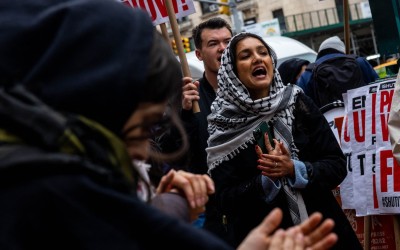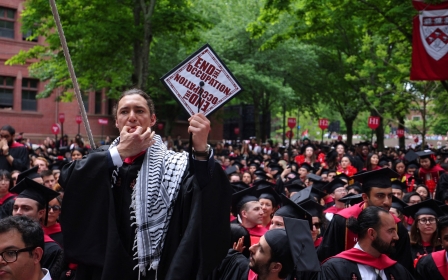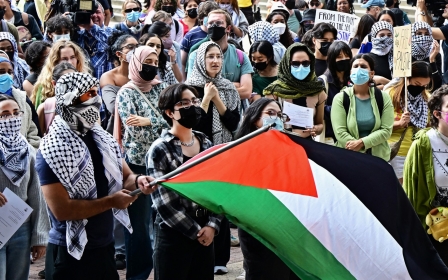Renewed crackdown on free speech aims to overwhelm US student protests

With President-elect Donald Trump's return to the White House in January, universities across the United States face a frenzy of pressure over handling student protests and free speech.
Pro-Palestinian demonstrations, sparked by Israel's ongoing war in Gaza, have become a political flashpoint that refuses to go away.
In May, during a congressional hearing, a Republican-led House Committee accused university leaders of giving into antisemitism, with the US director of national intelligence even alleging that Iran is providing financial support to pro-Palestine activists.
The incoming Trump administration has promised even more aggressive crackdowns, which could reshape the landscape of campus activism and expression.
The Trump administration could double down by weaponising the Department of Education’s Title VI anti-discrimination act to target campus activism, cloaking it as an effort to combat antisemitism.
New MEE newsletter: Jerusalem Dispatch
Sign up to get the latest insights and analysis on Israel-Palestine, alongside Turkey Unpacked and other MEE newsletters
Legal advisors and student activists fear this could spell the end of free speech in higher education, with students and faculty alike facing reprisals for simply engaging in pro-Palestinian or anti-war rhetoric.
“I worry that organisations and students who are involved in protest movements on campus will start being the subject of unwarranted federal investigations, whether by the Trump administration or by Congress,” said Udi Ofer, a Princeton professor and chair of the International Advisory Council of the Association for Civil Rights in Israel.
“Such investigations could have a serious impact on the willingness of students to express their views on campuses across the nation,” Ofer told Middle East Eye.
As of October, at least 60 universities are under federal probes across the US, which include accusations of fostering antisemitism or supporting terrorism under the guise of Palestinian solidarity.
Eric Lee, an attorney representing Prahlad Iyengar, an MIT student facing expulsion over an article in a student magazine called “On Pacifism,” fears the situation will worsen.
“The university explicitly accused him of promoting a terrorist organisation, the PFLP (Popular Front for the Liberation of Palestine),” Lee told MEE. “The attempt to play the role of Prahlad as a terrorist for this is a massive attack on the First Amendment, due process, and the democratic rights of the entire population.”
Prahlad is expected to have a hearing at the university, where he will not be allowed to have his attorneys present. Lee added that “one of the administrators who was responsible for pressing the charges against him will be the head of the hearing panel”.
Two birds with one stone
Lee’s concerns are not limited to the immediate legal implications. He believes the Trump administration could use this type of rhetoric to justify broader immigration crackdowns, especially targeting international students who participate in these protests.
“The Trump administration will likely be, in its effort to repeal student visas, required to claim that students are engaged in support for terrorism by demonstrating against the genocide,” Lee said.
Ofer, who also worked as an attorney at the American Civil Liberties Union for over 20 years, sees the crackdown as a gateway towards a wider attack on foreign students.
'These attacks could include unjustifiably revoking the immigration status of noncitizen students'
- Udi Ofer, Princeton Professor
“These attacks could include unjustifiably revoking the immigration status of noncitizen students who are in the United States on visas, or even beginning to wrongfully charge organisations and student activists with failing to register as foreign agents, both examples of ideas that are being floated.”
International students are already experiencing the chilling effects.
Momodou Taal, a Cornell student, recounted a veiled deportation threat after participating in protests. “We were told the university doesn’t have the power to deport,” Taal told MEE.
“But it was definitely constructed as deportation by the university because they told me that they are going to de-enroll me - when you de-enroll someone with an F1 visa, your visa is basically null and void.”
Trump’s statements at a private donor event on 14 May have been particularly alarming. According to a Washington Post article, Trump said to the donors, “One thing I do is, any student that protests, I throw them out of the country.”
He added, “You know there are a lot of foreign students. As soon as they hear that, they’re going to behave.”
Many international students are, by nature of their visa status, more vulnerable to retaliatory actions from universities or government entities.
In an environment where protest is increasingly seen as an act of defiance against US foreign policy, these students face the very real possibility of being silenced or removed from the country.
Project Esther
Much of the conservative push stems from the Heritage Foundation's "Project Esther: A National Strategy to Combat Antisemitism", an initiative aimed at combating what its backers call anti-Israel bias on campuses.
According to its website, it was "named after the historic Jewish heroine who saved the Jews from genocide in ancient Persia" and "provides a blueprint to counter antisemitism in the United States and ensure the security and prosperity of all Americans".
Central to the effort is the International Holocaust Remembrance Alliance's (IHRA) definition of antisemitism, which conflates criticism of Israel with antisemitism.
The IHRA definition has sparked heated debates, with advocates arguing it is necessary to protect Jewish students from discrimination, while opponents contend that it silences legitimate criticism of Israeli policy.
Tori Porell, an attorney with Palestine Legal, described how the Trump administration could weaponise this to undermine student activism.
“So far, Palestinian, Arab, and Muslim students have been able to rely on the Department of Education’s Office of Civil Rights to investigate discrimination,” Porell said. “But I think those investigations would look very different under a Trump administration.”
Porell says it is possible the Department of Education could adopt the IHRA definition, removing a potential layer of protection for students.
Ofer expressed concern that codifying the IHRA definition would chill free speech, calling such measures unnecessary. “Federal law already prohibits antisemitic discrimination and harassment by federally funded entities,” he said.
The use of the IHRA definition to target student activists is a major point of contention in the ongoing debate. Many students and organisations argue that the broad nature of the definition could lead to the criminalisation of political discourse on campus, particularly for those advocating for Palestinian rights or protesting against Israel’s policies in Gaza.
For students like Arman, a member of the Brown Divest Coalition, this poses a direct threat to their ability to organise and express their beliefs.
“These attacks on free speech and the right to protest aren’t even new, especially at the university level,” Arman said. “But this bill could fundamentally change how the state suppresses pro-Palestinian activism.”
The IHRA definition could also have broader implications for policy and funding. Universities that do not comply with the redefined standards of antisemitism may face pressure to withhold funding from student organisations or even lose federal financial support.
Ultimately, the resolution of these conflicts will shape the future of free expression in higher education.
How universities respond - whether by standing firm on free speech or yielding to external pressures - could define the boundaries of campus activism for years to come.
Legislation
Adding to the fears of an increasing crackdown is a wave of legislative efforts aimed at curbing pro-Palestinian activism in the United States, with several key bills expected to gain momentum under the next administration.
Among them are the Protect Economic Freedom Act and the IGO Anti-Boycott Act. The Protect Economic Freedom Act would withhold federal funding for universities engaging in commercial boycotts of Israel.
The bill aims to punish universities which concede to the demands of pro-Palestinian protestors to divest from Israel.
Meanwhile, the IGO Anti-Boycott Act seeks to restrict international governmental organisations from enforcing or supporting boycotts targeting US allies, including Israel.
The bill expands upon the existing Anti-Boycott Act, legislation that requires US citizens to refuse participation in boycotts organised by foreign governments against countries friendly to the US.
These proposed laws, alongside the recently passed “Nonprofit Killer” bill, paint an alarming picture for activists and advocacy organisations.
The Nonprofit Killer bill, passed by House Republicans, empowers the Treasury Department to strip nonprofits of their tax-exempt status for alleged ties to terrorism.
“We’ve seen congressional attempts to permit the Treasury secretary to strip the tax-exempt status of nonprofits without adequate due process protections,” Ofer said. “This should concern everyone.”
The bill threatens to decimate grassroots movements by cutting off crucial funding to organisations that might be viewed as too controversial or politically charged.
For activists like Arman, the bill signals a potential escalation in the legal battle for free speech on campuses. “We’re all looking at these bills and anticipating how the state is preparing to crack down on pro-Palestinian speech and protests supporting the Palestinian liberation movement,” he said.
Future of free speech
As universities grapple with external pressures, the stakes are high.
Will they defend free speech or cave to conservative demands and legislative changes?
For student activists like Taal and Arman, the answers will shape not only their rights but also the broader fight for Palestinian liberation.
The tensions on US campuses today could be the beginning of a new era of political repression and surveillance, where the boundaries of protest and free expression are redrawn by the forces of a resurgent right-wing establishment.
From potential federal investigations to new legislative threats, the next four years could redefine the boundaries of protest and dissent in US higher education.
“I think that the best way to respond to this is to raise awareness that the First Amendment is meant to take the government out of the business of deciding which speech is good and which speech is bad,” Ofer said.
“Now is the time to go back to basics and spend time with our students and campus communities to go over the principles that define liberal democracies.”
As Trump’s return looms, students, lawyers, and activists are bracing for an uphill battle to safeguard the First Amendment.
Middle East Eye delivers independent and unrivalled coverage and analysis of the Middle East, North Africa and beyond. To learn more about republishing this content and the associated fees, please fill out this form. More about MEE can be found here.






